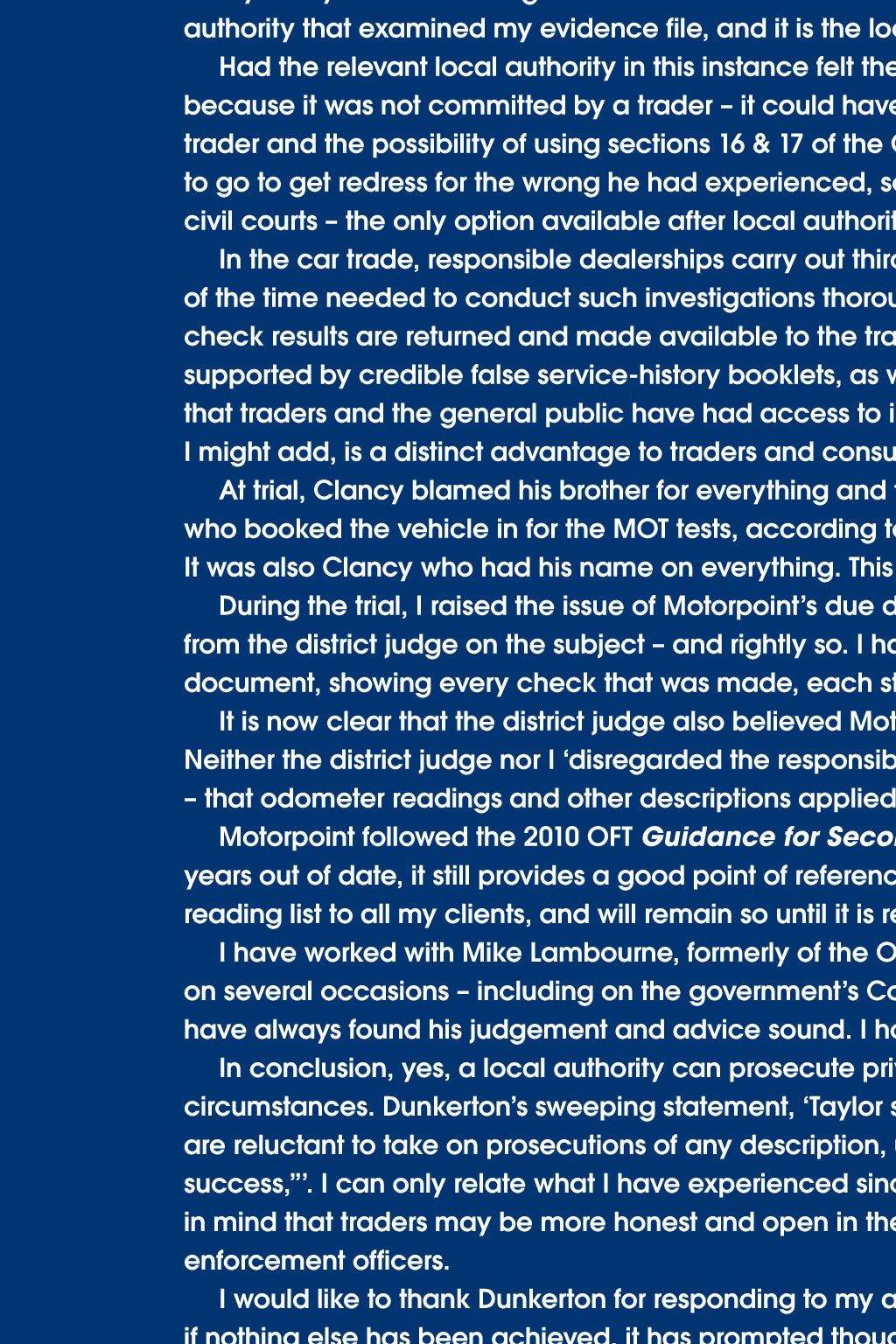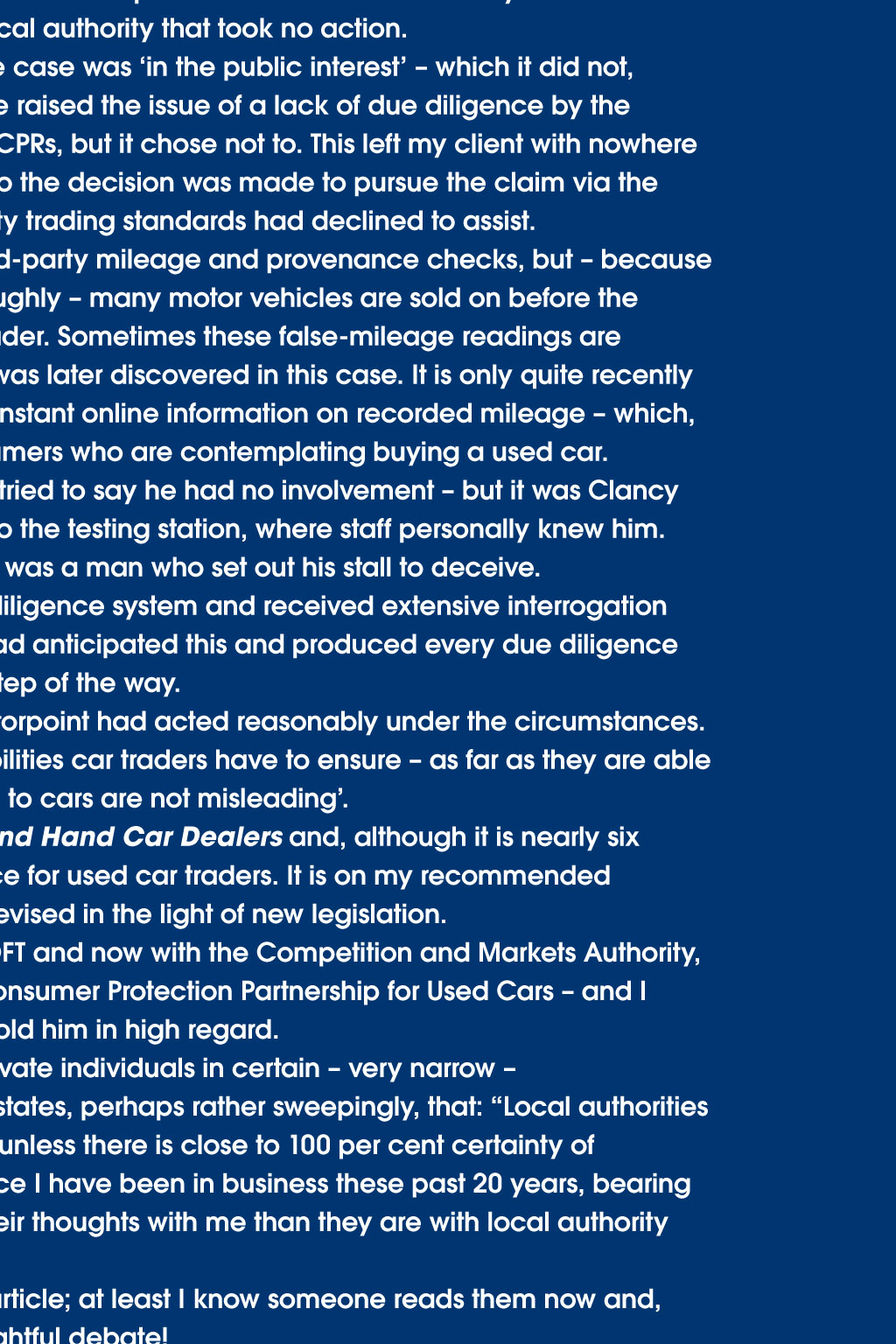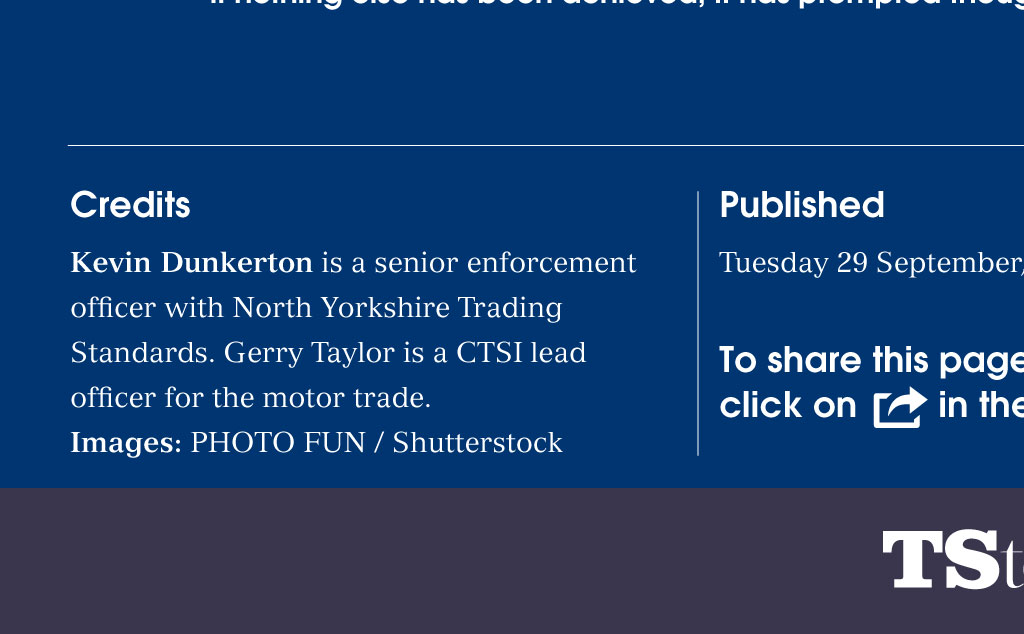




























In this feature l private sales l odometer readings l due diligence Clocking controversy kevin dunkerton takes issue with Gerry Taylor over his assertions that consumer protection laws dont cover private motor sales, and that local authorities are reluctant to prosecute T he article, No one is above the law by Gerry Taylor, CTSI lead officer for the motor trade, which was published in the July 2015 issue of TS Today concerning a civil claim made against a consumer who part-exchanged a clocked car provoked some debate in the offices of North Yorkshire Trading Standards. I dont believe his argument that consumer In what is believed to be the first prosecution protection laws do not include sales by private of its kind in the country, Gerry Taylor documents a case he tried and won in individuals is in any way an accurate reflection of the county court against a consumer who sold a clocked car to a national trader the legal position. Taylor references the Fraud Act 2006 and, indeed, historically, the reason many trading standards staff were authorised under the Theft Act 1968 was to investigate, and to report for prosecution, private individuals who had clocked cars. Car clocking In this feature l DVSA data l l false description judgment No one is above the law O nly car dealers clock cars, dont they? The Arthur Daleys who operate under the arches and those selling vehicles via auction? That is the usual perception, but it would appear the chances of buying a clocked vehicle from an auction is just about the same as buying one from a private seller, as Peterborough County Court found in May. In what is believed to be the first case of its kind in the country, adistrict judge found a consumer guilty of selling a clocked car to a national trader and ordered him to pay the price. The law Anyone could be selling a clocked car either through a private sale, atrade sale or at auction but the law usually only caters for traders that sell clocked vehicles in a consumer sale. Trading standards, being a consumer protection organisation, will generally only prosecute traders caught selling clocked cars to consumers, because there is no criminal offence committed by private sellers unless a prosecution is taken under the Fraud Act 2006 for dishonestly misrepresenting or failing to disclose with a view to gain. Consumer protection laws do not include sales by private individuals. In these times of austerity, local authorities are reluctant to take on prosecutions of any description, unless there is close to 100 per cent certainty of success. Recently, I was approached by national trader Motorpoint, which Consumer Protection Regulations What is missing from Taylors analysis is consideration of the act ordefault provisions of the Consumer Protection from Unfair TradingRegulations 2008 (CPRs), and those of the Trade Descriptions Act1968 (TDA). Regulation 16(2) of the CPRs is explicit the act or default provisions apply whether or not another person (Y) is a trader and whether or not Ys act or default is a commercial practice. Similarly, section 23 of the TDA provided an act or default offence where the commission of an offence was the fault of some other person. While the act was not as explicit as the regulations in applying this provision to private sellers, the case of Olgeirsson v Kitching [1986] 1 All ER 746, confirmed that a private seller could be guilty of an offence under the section. deals in more than 40,000 cars per year. It had taken a Land Rover in part exchange for a used Vauxhall Corsa an everyday occurrence in the motor trade. Before concluding the deal, Motorpoint carried out its normal due diligence checks to ensure the part-exchange vehicle was not subject to outstanding finance, stolen, a previous write-off or clocked. All issues appeared to be clear. The seller, Gregory Clancy, declared the Land Rover to have a genuine 87,134 miles on the clock and signed the Motorpoint documentation to this effect. When visually checking the vehicle, the experienced salesman saw no untoward signs of excessive wear or other indications that would have pointed to the mileage being higher. There was no reason to doubt the word of Clancy, so a part exchange allowance of 8,200 was agreed against the purchase of the Vauxhall Corsa. Motorpoint subsequently sold the Land Rover into the trade market via an auction, making no warranties over mileage or mechanical condition, as is normal in any trade sale. Another trader bought the vehicle and subsequently sold it on to a consumer. Some months later, the trader was approached by the consumer, whohad discovered after taking the Land Rover to a dealership for anMoT and service that the vehicle had previously had a higher recorded mileage reading, according to the Driver and Vehicle Standards Agency (DVSA) website. The customer wished to keep the vehicle, but wanted a reduction A false mileage reading is a false description and a misrepresentation, both of which are actionable using the Sale of Goods Act 1979 (as amended) or the Misrepresentation Act 1967 in price in view of the higher mileage. A deal was negotiated betweenthetwo traders and the consumer, and an adjustment in price was made. The vehicles highest recorded mileage was 162,555 on 8 August 2013, when it underwent an MoT test in Bedford. It had been bought by Clancy in August 2011, when the mileage was 135,541, recorded during an MoT test at a garage in Gatwick. Clancy had two further MoT tests carried out during his ownership of the Land Rover: in April 2012 when 157,568 miles were recorded and in August 2013, when 162,555 miles were documented. During my enquiries, it was revealed that the vehicle failed its MoT on8 August 2013 at 162,555 miles because of a faulty headlamp, and faults with both front brakes and both front windscreen washers. Theseissues were rectified and the vehicle passed its retest the next day. On 4 March 2014, with a mileage reading of 87,199, the vehicle underwent its annual MoT test and failed because of: faulty windscreen wipers; a missing offside rear reflector; the nearside front direction indicator being the wrong colour; the front passenger door not closing securely; the nearside headlamp aim being out of line; both rear shock absorbers being defective; and a leaking power-steering component. On8 March 2014, at 87,199 miles, it passed its retest. On 17 December 2014, the Land Rover with a declared mileage reading by Clancy of 87,134 was offered to Motorpoint in part exchange for a Vauxhall Corsa. Case comparison The facts of that case are similar to the Motorpoint scenario, in that a private individual who knew the odometer reading on a car was false part-exchanged that car and claimed the mileage was only 8,000 more than shown on the odometer (30,000 miles) when it had actually travelled at least 74,000 miles. The court considered the construction of section 23 and found the plain and ordinary meaning should be given to it. According to McNeillJ: In the circumstances, therefore, the answer to the question is that the justices were right to conclude that the appellant in his capacity as a private individual was guilty of the offence charged. Notwithstanding that, Gregory Clancy the private individual in the present case may have committed an offence, I would also have considered whether Motorpoint, and the car trader who bought the car from auction, had themselves done enough by way of checks to establish a due diligence defence under Regulation 17 of the CPRs. That would, of course, require not only that reliance was placed on information supplied by another, but also that the trader himself took all reasonable precautions and exercised all due diligence to avoid the commission of the offence. I note Taylor reports the district judge as finding that Motorpoint had adequately fulfilled its legal obligations with its due diligence procedures, and I am writing this response without the benefit of the full case facts that Taylor had to hand. However, Iam concerned that such an approach can disregard the responsibilities car traders have to ensure In res pons e as far as they are able that odometer readings and other descriptions applied to cars are not misleading. The 2010 Office of Fair Trading (OFT) guidance for second-hand car dealers sets out, in Part 5, the steps that would assist a dealer to comply with the CPRs. Asking the seller to sign a statement about the current mileage is mentioned as one of the checks to undertake but in my interpretation is not of itself sufficient to establish a defence. The guidance recommends: a vehicle history check with an independent company; making enquiries with the current keeper; askingfor service documents; and checking DVLA and VOSA databases. Iwould have expected Motorpoint to ask for the service history and to check the MOT database. I am somewhat surprised by the suggestion that it was not up to date in 2012, as I believe it was available as long ago as 2006. It is the first check that I advise car dealers in my area toconduct. Because of the reduced mileage reading, the vehicle tendered by Clancy was worth 3,600 less than its selling price, which meant Motorpoint was out of pocket to the tune of 1,937, allowing for the loss of resale profit and the agreed price adjustment for the innocent consumer purchaser. Although criminal law does not usually account for false mileage readings presented by consumers. There are steps that can be taken under civil law. A false mileage reading is afalsedescription and a misrepresentation, both of which are actionable using the Sale of Goods Act 1979 (as amended) or the Misrepresentation Act 1967. Court judgment An action was started in the small claims division of the county court forlosses amounting to 2,132, plus costs. The defendant Clancy made a token response to the claim but nothing more. It was fully expected that he would not appear at court on the day of the hearing. On 6 May, the case was heard by a district judge at Peterborough County Court. Clancy did appear in person and put forward the defence that he was only selling the vehicle on behalf of his brother, who was the true owner, but who had no credit record or driving record and could not afford insurance. The defendant was, therefore, entered as a named driver on a policy taken out by his brother. The V5 registration document was in the name of Clancy, the defendant, who said he had no knowledge of the mileage reading because he did not drive the car it was his brothers vehicle. Under cross-examination and when questioned by the district judgeas to why he had signed the declaration saying the genuine mileage reading was 87,134 Clancy said that this was the mileage written by the salesman, and he had no knowledge of it. The witness for Motorpoint said the mileage was taken directly from the odometer by the salesman in the presence of Clancy just before thesale. Clancy said the false mileage reading was the fault of Motorpoint because it had not checked it thoroughly enough before purchase. It would appear that the traders checks were made when the DVSA website was in its infancy and data was still being inputted. This wouldaccount for there being a lack of information on the mileagechecking service providers database when Motorpoint made its enquiryat the time of sale. A later check showed the Land Rovers full mileage history This documentary evidence had only just been introduced by the government and the DVSA has recently also implemented its online service for checking MoT certificates, which require vehicle mileages to be disclosed. In summing up, the district judge said he could find nothing in favour of Clancys defence and Motorpoint had adequately fulfilled its legal obligations with its due diligence procedures. He also said that Motorpoint would have been entitled to the equitable remedy of unjust enrichment, which is a common law I dont believe his argument that consumer protection laws do not include sales by private individuals is in any way an accurate reflection of the legal position provision which means a person obtains a benefit to which he was notentitled in this case, the additional remuneration of a lowermileage vehicle. Clancy was ordered to pay 2,462.90 for the loss of profit and interestto the day, which included a contribution of 265 towards Motorpoints costs. As this case demonstrates, the law works both ways as far as clocking cars is concerned. Credits Published Gerry Taylor is a chartered trading Tuesday 30 June, 2015 standards practitioner and CTSIs lead officer for the motor trade. Images: Oskal / Shutterstock You might also like Finding fault July 2015 To share this page, click on in the toolbar Clear guidance Gerry Taylor states, perhaps rather sweepingly, that: Local authorities are reluctant to take on prosecutions of any description, unless there is close to 100 per cent certainty of success I think it is also worth pointing out that the guidance, and a subsequent 2011 letter from Mike Lambourne of the OFT, specifically about car auctions, is clear that even where a car is entered into a trade auction responsibility for any misleading action that subsequently occurs in aconsumer transaction could lie with the trader who entered the car into the auction. Lambourne, on behalf of the OFT, was of the view thata trader should check the vehicles history and mileage and disclose the results. Taylor states, perhaps rather sweepingly, that: Local authorities are reluctant to take on prosecutions of any description, unless there is close to 100 per cent certainty of success. While I fully recognise the impact austerity has had on trading standards services, I have to take issue with this assertion. Many services are still able to take prosecutions either individually or via their regional Scambuster team and I would encourage trading standards services to give full consideration to all the tools available to them, whether that is the provision of business advice or Primary Authority guidance, seeking an undertaking or enforcement order, or simple caution or prosecution. After all, the cost of a car is often the largest amount of money a consumer will spend after buying their house, and the second-hand car market is, year on year, the most complained about trade sector. It is also one whose unfair practices trading standards staff can significantly impact by using the appropriate enforcement mechanism. IN RESPONSE Original author of the Motorpoint court case, gerry taylor, addresses the points raised by kevin Dunkerton Motorpoint, the injured party and claimant in this case, has in place at all of its eight nationwide outlets a comprehensive and robust due diligence system of checks. All these checks comply with the suggestions contained in part five of the Office of Fair Trading (OFT) Guidance for Second Hand Car Dealers 2010. Motorpoint did not buy the car from auction, but had purchased a car that had been clocked by Gregory Clancy from Clancy as a part-exchange vehicle. Clancy had owned the vehicle since 18 August 2011 and had entered it for three MOT tests, one of them being a fail, during his ownership. The last one showed the mileage reduction before its sale to Motorpoint. When this case was referred to me for investigation, around April 2014, my first action was to check the Vehicle and Operator Services Agency (VOSA) website and, at that time, the mileage data was not populated. This confirmed the actions taken by Motorpoint and it provided me with a printout confirming these actions, which did not show mileage data. In my experience, data history has only been available from VOSA since 16 October 2011, when it started to change its systems and move them online. Initially, it was only current data and not historic data. As the data was not available when I checked in April 2014, I assumed because of the rebranding of the Driver and Vehicle Standards Agency (DVSA), and the move to online details that all data had not yet been uploaded. A subsequent check during the investigation provided me with a full print out of the entire MOT history of the vehicle, which showed precisely when and where the clocking had taken place. This was produced as evidence at the trial. The Consumer Protection from Unfair Trading Regulations 2008 (CPRs) do not, generally, cover clocking committed by private sellers. However, I agree with Kevin Dunkerton that, if Motorpoint, as a trader, was prosecuted under the regulations and they used the due diligence bypass rules a prosecution against the private seller would have been possible, in theory. I am not employed by a local authority, so I have no powers to prosecute under the CPRs and these are only applicable to traders acting in the course of a business, except for the bypass rules. In the course of my work, I come across many criminal offences that I feel ought to be prosecuted. Since 1996, I have had only one authority take on a prosecution (and it won). All the others have declined the offer and the reason given was a lack of resources or that the case was not in the public interest. My analysis is not missing the consideration of the act or default provisions this was missed by the local authority that examined my evidence file, and it is the local authority that took no action. Had the relevant local authority in this instance felt the case was in the public interest which it did not, because it was not committed by a trader it could have raised the issue of a lack of due diligence by the trader and the possibility of using sections 16 & 17 of the CPRs, but it chose not to. This left my client with nowhere to go to get redress for the wrong he had experienced, so the decision was made to pursue the claim via the civil courts the only option available after local authority trading standards had declined to assist. In the car trade, responsible dealerships carry out third-party mileage and provenance checks, but because of the time needed to conduct such investigations thoroughly many motor vehicles are sold on before the check results are returned and made available to the trader. Sometimes these false-mileage readings are supported by credible false service-history booklets, as was later discovered in this case. It is only quite recently that traders and the general public have had access to instant online information on recorded mileage which, I might add, is a distinct advantage to traders and consumers who are contemplating buying a used car. At trial, Clancy blamed his brother for everything and tried to say he had no involvement but it was Clancy who booked the vehicle in for the MOT tests, according to the testing station, where staff personally knew him. It was also Clancy who had his name on everything. This was a man who set out his stall to deceive. During the trial, I raised the issue of Motorpoints due diligence system and received extensive interrogation from the district judge on the subject and rightly so. I had anticipated this and produced every due diligence document, showing every check that was made, each step of the way. It is now clear that the district judge also believed Motorpoint had acted reasonably under the circumstances. Neither the district judge nor I disregarded the responsibilities car traders have to ensure as far as they are able that odometer readings and other descriptions applied to cars are not misleading. Motorpoint followed the 2010 OFT Guidance for Second Hand Car Dealers and, although it is nearly six years out of date, it still provides a good point of reference for used car traders. It is on my recommended reading list to all my clients, and will remain so until it is revised in the light of new legislation. I have worked with Mike Lambourne, formerly of the OFT and now with the Competition and Markets Authority, on several occasions including on the governments Consumer Protection Partnership for Used Cars and I have always found his judgement and advice sound. I hold him in high regard. In conclusion, yes, a local authority can prosecute private individuals in certain very narrow circumstances. Dunkertons sweeping statement, Taylor states, perhaps rather sweepingly, that: Local authorities are reluctant to take on prosecutions of any description, unless there is close to 100 per cent certainty of success,. I can only relate what I have experienced since I have been in business these past 20 years, bearing in mind that traders may be more honest and open in their thoughts with me than they are with local authority enforcement officers. I would like to thank Dunkerton for responding to my article; at least I know someone reads them now and, if nothing else has been achieved, it has prompted thoughtful debate! Credits Published You might also like Kevin Dunkerton is a senior enforcement Tuesday 29 September, 2015 Satisfaction guaranteed? October 2015 officer with North Yorkshire Trading Standards. Gerry Taylor is a CTSI lead officer for the motor trade. Images: PHOTO FUN / Shutterstock To share this page, click on in the toolbar